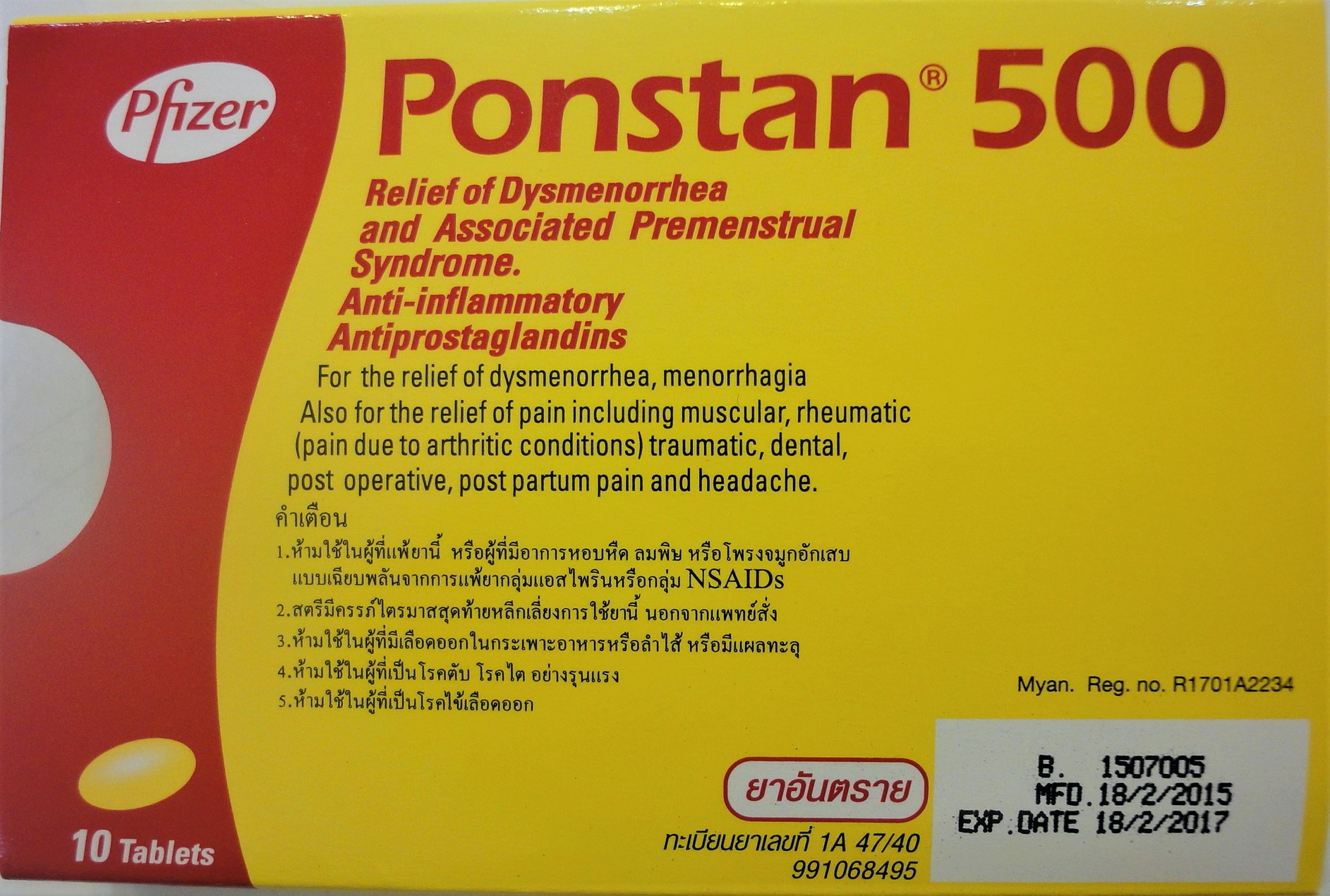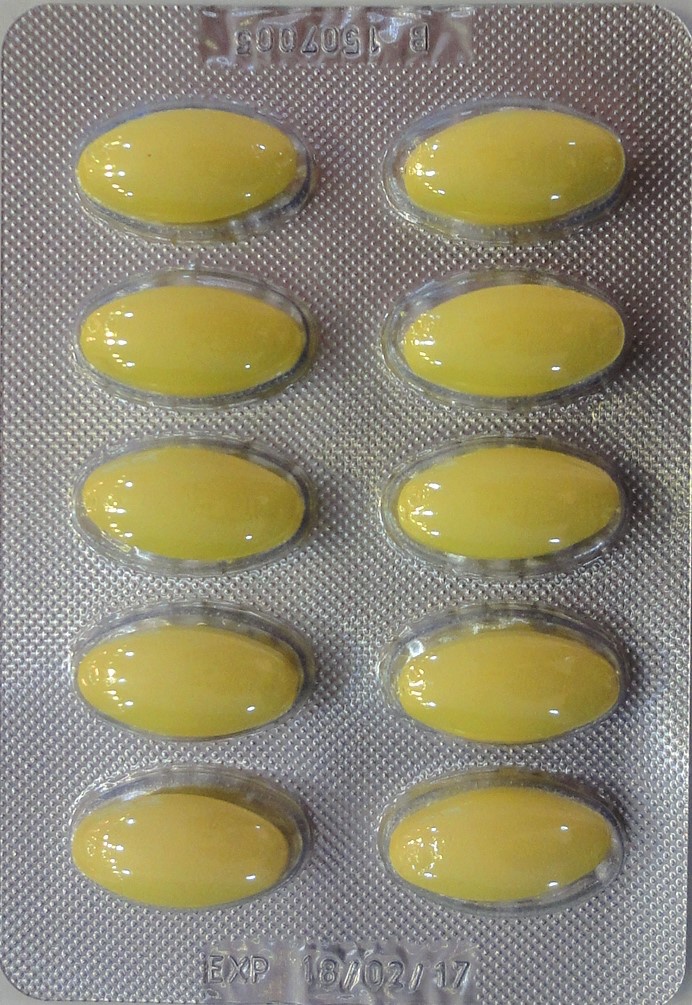PONSTAN Tablet
ក្រុមហ៊ុនផលិតឱសថ:
OLIC (Thailand) Limited, Thailand
ក្រុមហ៊ុនចែកចាយឱសថនៅប្រទេសកម្ពុជា:
DKSH


- សារធាតុសកម្ម
- ប្រសិទ្ធិភាពព្យាបាល និង កម្រិតប្រើប្រាស់
- ហាមប្រើ
- ផលរំខាន
- អន្តរប្រតិកម្ម
- ស្ត្រីមានផ្ទៃពោះ និង ស្ត្រីបំបៅដោះកូន
- ការប្រុងប្រយ័ត្នជាពិសេស បរិយាយប័ណ្ណឱសថ
-
សារធាតុសកម្ម
Mefenamic acid 500mg
-
ប្រសិទ្ធិភាពព្យាបាល និង កម្រិតប្រើប្រាស់
Therapeutic Indications:
Mefenamic acid is indicated for:
1) The symptomatic relief of rheumatoid arthritis (including Still's Disease), osteoarthritis and pain including muscular, traumatic and dental pain, headaches of most etiology, postoperative and postpartum pain.
2) The symptomatic relief of primary dysmenorrhoea
3) Menorrhagia due to dysfunctional causes or the presence of an intrauterine device (IUU) when organic pelvic pathology has been excluded.
4) Premenstrual syndrome.
5) Tile relief of pyrexia in pediatric patients over 6 months of age.
Posology and method of administration:
Undesirable effects may be minimized by using the minimum effective dose for the shortest duration necessary to control symptoms.
The oral dosage form of mefenamic acid may be taken with food if gastrointestinal upset occurs.
Mild to moderate pain/rheumatoid arthritis/osteoarthritis in adults and adolescents over 14 years of age: 500 mg three times daily.
Dysmenorrhea: 500 mg three times daily, to be administered at the onset of menstrual pain and continued while symptoms persist according to the judgement of the physician.
Menorrhagia: 500 mg three times daily, starting with the onset of bleeding and associated symptoms and continued according to the judgement of the physician.
Premenstrual syndrome: 500 mg three times daily starting with the onset of symptoms and continued until the anticipated cessation of symptoms according to the judgement of the physician.
For Still’s Disease or antipyretic action in infants and children over 6 months to 14 years: 19.5 mg/kg to 25 mg/kg of body weight daily in divided doses three times daily.
Pediatric use:
Mefenamic acid is reported to be effective for pyrexia, in pediatric patients over 6 months of age and for pain in adolescents over 14 years of age.
Use in the Elderly:
Impairment of renal function, sometimes leading to acute renal failure, has been reported Elderly or debilitated patients seem unable to tolerate ulceration or bleeding as well as some other individual most spontaneous reports of fatal gastrointestinal events are in this patient population (see Special precautions).
-
ហាមប្រើ
Mefenamic acid should not be used in patients with known hypersensitivity to mefenamic acid or any of the components of this product.
Because the potential exists for cross sensitivity to aspirin or other nonsteroidal anti-inflammatory drugs, mefenamic acid should not be given to patients in whom these drugs induce symptoms of bronchospasm, allergic rhinitis, or urticaria.
Mefenamic acid is contraindicated in patients with active ulceration or chronic inflammation of either the upper or lower gastrointestinal tract and should be avoided in patients with pre-existing renal disease.
Treatment of peri-operative pain in the setting of coronary artery bypass gran (CABG) surgery.
Patients with severe renal and hepatic failure.
Patients with severe heart failure.
-
ផលរំខាន
Blood and lymphatic system disorders: agranulocytosis, aplastic anemia, autoimmune hemolytic anemia, bone marrow hypoplasia, platelet aggregation inhibition.
Immune system disorders: anaphylaxis.
Metabolism and nutrition disorders: glucose intolerance in diabetic patients, hyponatremia, fluid retention.
Psychiatric disorders: nervousness
Nervous system disorders: aseptic meningitis, blurred vision, convulsion, dizziness, drowsiness, headache and insomnia.
Eye disorders: eye irritation, reversible loss of color vision
Ear and labyrinth disorders: ear pain
Cardiac disorders: palpitation
Vascular disorders: hypotension, hypertension
Respiratory, thoracic and mediastinal disorders: asthma, dyspnea
Gastrointestinal disorders: Gastrointestinal inflammation, gastrointestinal hemorrhage, gastrointestinal ulcer, gastrointestinal perforation.
The most frequently reported side effects associated with mefenamic acid involve the gastrointestinal tract. Diarrhea appears to be the most common side effect and is usually dose related. It generally subsides on dosage reduction, and rapidly disappears on termination of therapy. Some patients may not be able to continue therapy.
The following are the most common gastrointestinal side effects: abdominal pain, diarrhea and nausea with or without vomiting.
-
អន្តរប្រតិកម្ម
Anticoagulants: Mefenamic acid has been shown to displace warfarin from protein binding sites, and may enhance the response to oral anticoagulants. Therefore, concurrent administration of mefenamic acid with oral anticoagulant drugs requires frequent prothrombin time monitoring.
Anti-hypertensives including diuretics, angiotensin-converting enzyme (ACE) inhibitors and angiotensin II antagonists (AIIA): NSAIDs can reduce the efficacy of diuretics and other antihypertensive drugs.
In patients with impaired renal function (e.g. dehydration patients or elderly patients with compromised renal function, the co-administration of an ACE inhibitor or an AIIA with a cyclo-oxygenase inhibitor can increase the deterioration of an ACE inhibitor or an AIIA with a cyclo-oxygenase inhibitor can increase the deterioration of the renal function, including the possibility of acute renal failure, which is usually reversible. The occurrence of these interactions should be considered in patients taking mefenamic acid with an ACE inhibitor or an AIIA.
Therefore, the concomitant administration of these drugs should be done with caution especially in elderly patients. Patients should be adequately hydrated and the need to nonitor the renal function should be assessed in the beginning of the concomitant treatment and periodically thereafter.
Corticosteroids: increased risk of gastrointestinal ulceration or bleeding.
Cyclosporine: Because of their effect on renal prostaglandins cyclooxygenase inhibitors such as diclofenac can increase the risk of nephrotoxicity with cyclosporine.
Hypoglycemic agents: there have been reports of changes in the effects of oral hypoglycemic agents in the presence of NSAIDs. Therefore, mefenamic acid should be administered with caution in patients receiving insulin or oral hypoglycemic agents.
Lithium: Mefenamic acid has produced an elevation of plasma lithium levels and a reduction in renal lithium clearance. Thus, when mefenamic acid and lithium are administered concurrently, patients should be observed carefully for signs of lithium toxicity.
Methotrexate: caution is advised when methotrexate is administration concurrently with NSAIDs, including mefenamic acid because NSAID administration may result in increased plasma levels of methotrexate.
Tacrolimus: Possible increased risk of nephrotoxicity when NSAIDs are given with tacrolimus.
-
ស្ត្រីមានផ្ទៃពោះ និង ស្ត្រីបំបៅដោះកូន
Pregnancy:
Since there are no adequate and well-controlled studies in pregnant women, this drug should be used only if the potential benefits to the mother justify the possible to the fetus. It is not known if mefenamic acid or its metabolites cross the placenta. However, because of the effects of drugs in this class (i.e., inhibitors of prostaglandin synthesis) on the fetal cardiovascular system (e.g., premature closure of the ductus arteriosus) the use of mefenamic acid in pregnant women is not recommended, Mefenamic acid inhibits prostaglandin synthesis which may result in prolongation of pregnancy and interference with labor when administered late in the pregnancy. Women on mefenamic acid therapy should consult their physician if they decide to become pregnant.
Inhibition of prostaglandin synthesis might adversely pregnancy. Data from epidemiological studies suggest an increased risk of spontaneous abortion after use of prostaglandin synthesis inhibitors in early pregnancy. In animals’ administration of prostaglandin synthesis inhibitors has been shown to result in increased pre and post-implantation loss.
Lactation
Trace amounts of mefenamic acid may be present in breast milk and transmitted to the nursing infant. Therefore, mefenamic acid should not be taken by nursing mothers.
-
ការប្រុងប្រយ័ត្នជាពិសេស
The use of mefenamic acid with concomitant NSAIDs including COX-2 inhibitors should be avoided.
Cardiovascular Effects
NSAIOs may cause an increased risk of serious cardiovascular thrombotic events, myocardial infarction, and stroke, which can be fatal. This risk may increase with duration of use. Patients with known cardiovascular disease may be at greater risk. To minimize the potential risk for an adverse cardiovascular event in patients treated with mefenamic acid, the lowest effective dose should be used for the shortest duration possible. Physicians and patients should remain alert for the development of such events, even in the absence of previous cardiovascular symptoms. Patients should be informed about the signs and/or symptoms of serious cardiovascular toxicity and the steps to take if they occur (see Contraindications).
Hypertension
As with all NSAIDS, mefenamic acid can lead to the onset of new hypertension or worsening of pre-existing hypertension, either of which may contribute to the increased Incidence of cardiovascular events. NSAIDs, including mefenamic acid, should be used with caution in patients with hypertension. Blood pressure should be monitored closely during the initiation of therapy with mefenamic acid and throughout the course of therapy.
Fluid Retention and Edema
As with other drugs known to inhibit prostaglandin synthesis fluid retention and edema have been observed in some patients taking NSAIDs, including mefenamic acid. Therefore
mefenamic acid should be used with caution in patients with compromised cardiac function and other conditions predisposing to, or worsened by, fluid retention. Patients with pre-existing
congestive heart failure or hypertension should be closely monitored.
Gastrointestinal (GI) Effects
If diarrhea occurs, the dosage should be reduced or temporarily suspended. Symptoms may recur in certain patients following subsequent exposure.
NSAIDs, including mefenamic acid, can cause serious gastrointestinal (GI) adverse events, including inflammation, bleeding, ulceration, and perforation of the stomach, small intestine, or large intestine, which can be fatal. When GI bleeding or ulceration occurs in patients receiving mefenamic acid, the treatment should be withdrawn. Patients most at risk of developing these types of GI complications with NSAIDs are the elderly, patients with cardiovascular disease, patients using concomitant aspirin, or patients with a poor history of, or active, gastrointestinal disease, such as ulceration, GI bleeding or inflammatory conditions. Therefore, mefenamic acid should be used with caution in these patients (see Contraindications).
Skin Reactions
Serious skin reactions, some of them fatal, including exfoliative dermatitis, Stevens-Johnson syndrome, and toxic epidermal necrolysis, have been reported very rare in association with the use of NSAIDs, including mefenamic acid. Patients appear to be at highest risk for these events early in the course of therapy, the onset of the event occurring in the majority of cases within the first month of treatment Mefenamic acid should be discontinued at the first appearance of skin rash, mucosal lesions, or any other sign of hypersensitivity.
Laboratory Tests
A false-positive reaction for urinary bile, using the diazo tablet test, may result following mefenamic acid administration. If biliuria is suspected, other diagnostic procedures, such as the Harrison spot test should be performed.
Renal Effects
ln rare cases, NSAIDs, including mefenamic acid, may cause interstitial nephritis, glomerulitis, papillary necrosis and the nephrotic syndrome. NSAIDs inhibit the synthesis of renal prostaglandin which plays a supportive role in the maintenance of renal perfusion in patients whose renal blood flow and blood volume are decreased in these patients, administration of an NSAID may precipitate overt renal decompensation, which is typically followed by recovery to pretreatment state upon discontinuation of NSAID therapy. Patients at greatest risk of such a reaction are those with congestive heart failure, liver cirrhosis, nephrotic syndrome, overt renal disease and the elderly. Such patients should be carefully monitored while receiving NSAID therapy.
Discontinuation of nonsteroidal anti-inflammatory drug (NSAID) therapy is typically followed by recovery to the pre-treatment state. Since mefenamic acid metabolites are eliminated primarily by the kidneys the drug should not be administered to patients with significantly impaired renal function.
Hematologic Effects
Mefenamic acid can inhibit platelet aggregation and may prolong prothrombin time in patients on warfarin therapy (see Interactions with other medicinal products and other forms of interaction).
Hepatic Effects
Borderline elevations of one or more liver function tests may occur in some patients receiving mefenamic acid therapy. These elevations may progress, may remain essentially unchanged, or may be transient with continued therapy. A patient with symptoms and/or signs suggestion liver dysfunction, or in whom an abnormal liver test has occurred, should be evaluated for evidence of the development of a more severe hepatic reaction while on therapy with mefenamic acid if abnormal liver tests persist or worsen, if clinical signs and symptoms consistent with liver disease develop, or if systemic manifestations occur, mefenamic acid should be discontinued.
*ព័ត៌មានឱសថត្រូវបានរៀបរៀងដោយ អ៊ីម៉ាតុគឹ មេឌីក (ខេមបូឌា) ដោយផ្អែកលើប្រភពព័ត៌មានខាងក្រោម។ សម្រាប់ព័ត៌មានលម្អិត សូមស្វែងរកនៅក្នុងក្រដាសព័ត៌មាននៃឱសថនីមួយៗ ឬ សាកសួរទៅកាន់ក្រុមហ៊ុនឱសថឬតំណាងចែកចាយនៃឱសថនីមួយៗ។
ប្រភពព័ត៌មាន៖
- ក្រដាសព័ត៌មាននៃឱសថសម្រាប់អ្នកជំនាញវេជ្ជសាស្ត្រដែលប្រើប្រាស់នៅប្រទេសជប៉ុន (Pharmaceutical and Medical Devices Agency, Pmda): https://www.pmda.go.jp
- ព័ត៌មានសង្ខេបនៃឱសថសម្រាប់អ្នកជំងឺដែលប្រើប្រាស់នៅប្រទេសជប៉ុន: http://www.rad-ar.or.jp
